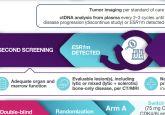Real-world HRRm testing in metastatic castration-resistant prostate cancer in the United States Europe, and Japan

Prostate cancer remains the second most common male cancer worldwide, with many patients developing therapeutic resistance and eventually metastatic disease. A recently published research article in our partner journal Future Oncology, is the first to investigate factors associated with testing and barriers to testing in the US, Europe and Japan. The surveys’ main objective was to examine homologous recombination repair mutation (HRRm) testing patterns within a real-world sample of patients with metastatic castration-resistant prostate cancer (mCRPC) in these different regions. Data was collected using the Adelphi Real World Prostate Cancer Disease Specific Programme (DSP™) in the US, EU5 (France, Germany, Italy, Spain and the United Kingdom [UK]) and Japan, between January and August 2020. A total of 391 physicians participated in the survey: 72 in the US, 236 in EU5 (France: 57; Germany: 50; Italy: 46; Spain:46; UK: 37), and 83 in Japan. The physicians reported HRRm testing and positivity rates for 1913 patients, which were 18.1% and 33.7%, respectively. Of those patients, 347 were tested and the most common HRR genes tested were BRCA (91.6%) and ATM (47.3%). View the full paper here.
Abstract
Aim: To assess homologous recombination repair mutation (HRRm) testing patterns in metastatic castration-resistant prostate cancer.
Methods: A point-in-time, international survey conducted January−August 2020.
Results: Three-quarters of physicians (oncologists, urologists, specialist surgeons) globally reported access to genetic/genomic testing and just over half were HRRm testers. Surveyed physicians reported HRRm testing and positivity rates for 1913 patients, which were 18.1% and 33.7%, respectively. Of patients tested (n=347), most common HRR genes tested were BRCA (91.6%) and ATM (47.3%).
Conclusion: Overall testing rates were low, with physicians mostly testing patients whom they considered higher risk. Increased awareness and education are needed to encourage broader testing, understand familial risk and identify patients with worse outcomes or those eligible for life-prolonging treatments.
Lay Abstract
Metastatic castration-resistant prostate cancer (mCRPC) is cancer that has spread beyond the prostate gland and that no longer responds to hormone therapy. Genetic testing is now recommended for patients with mCRPC to help doctors understand familial risk and identify patients who may benefit from new treatments. We asked doctors questions about their patients, such as their age, symptoms and genetic testing.
We found that overall genetic testing rates were low, with doctors mostly testing patients they thought were at higher risk of developing cancer. Increased doctor awareness and education are needed to encourage more genetic testing in mCRPC patients. However, doctors claimed that the cost of these tests was a challenge to conducting genetic testing.





